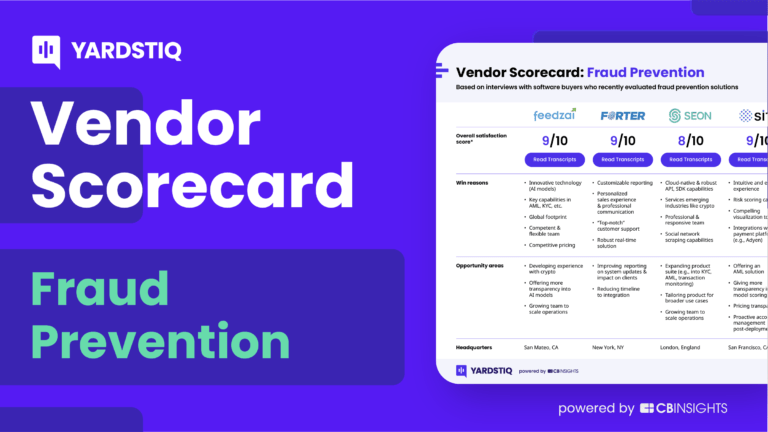
Riskified
Founded Year
2013Stage
IPO | IPOTotal Raised
$228.65MDate of IPO
7/28/2021Market Cap
0.77BStock Price
4.50Revenue
$0000About Riskified
Riskified provides a payment fraud management platform. It helps businesses reduce fraud losses, improve customer experience, and manage sales. It offers solutions for online merchants, marketplaces, electronic travel retailers, and digital goods and services providers. The company was founded in 2013 and is based in New York, New York.
Loading...
ESPs containing Riskified
The ESP matrix leverages data and analyst insight to identify and rank leading companies in a given technology landscape.
The payments fraud detection & prevention market offers a range of technologies helping businesses detect and block anomalous payment activity. Vendors in this market cater to many different industries, from financial services to e-commerce. These solutions cover a range of different types of financial fraud like chargebacks, ACH, wire, and credit card fraud.
Riskified named as Challenger among 15 other companies, including Mastercard, Oracle, and Fiserv.
Loading...
Research containing Riskified
Get data-driven expert analysis from the CB Insights Intelligence Unit.
CB Insights Intelligence Analysts have mentioned Riskified in 2 CB Insights research briefs, most recently on Feb 27, 2023.

Feb 27, 2023 report
Top fraud prevention companies — and why customers chose themExpert Collections containing Riskified
Expert Collections are analyst-curated lists that highlight the companies you need to know in the most important technology spaces.
Riskified is included in 11 Expert Collections, including E-Commerce.
E-Commerce
11,046 items
Companies that sell goods online (B2C), or enable the selling of goods online via tech solutions (B2B).
Regtech
1,563 items
Technology that addresses regulatory challenges and facilitates the delivery of compliance requirements. Regulatory technology helps companies and regulators address challenges ranging from compliance (e.g. AML/KYC) automation and improved risk management.
SMB Fintech
1,648 items
Payments
3,034 items
Companies in this collection provide technology that enables consumers and businesses to pay, collect, automate, and settle transfers of currency, both online and at the physical point-of-sale.
Tech IPO Pipeline
282 items
Track and capture company information and workflow.
Conference Exhibitors
5,302 items
Latest Riskified News
Oct 30, 2024
Dr. Galit Desheh, the professional director of Power in Diversity, presented the diversity report at the organization's conference, which shows that while the diversity initiatives may be effective in increasing the general presence of women, they do not adequately deal with the challenges that women experience in leadership. And who are the leading companies in employee diversity? Maya Nahum Shahal "In 2023, the slogan was 'Israeli Tech No Matter What,' and we had no idea what we were in for," said Dr. Galit Desheh, the professional director of Power in Diversity, while revealing the diversity report of the Israeli startup industry at the Power in Diversity conference. "The goal was to keep moving forward quickly. Even this industry, which thrives on instability and ups and downs, could not have imagined what awaited us." In 2023, the high-tech industry in Israel faced both internal and external challenges after a decade of growth and resilience. Following a year of protests against judicial reforms, these challenges intensified on October 7 with the outbreak of war. In many companies, 30% of the workforce was called into the IDF reserves. However, the industry quickly adapted, redirecting its technologies to support national needs while maintaining relationships with global investors. (Photo: Avigail Uzi) The collective trauma continued to affect the industry, marked by the loss among key figures and deepening ideological divides. Nevertheless, the high-tech sector mobilized rapidly. Professionals adapted technologies to support national efforts, assisted in locating abductees, and raised funds. Startups modified their tools to coordinate evacuations and provide crisis support, while drone companies and venture capital funds donated military equipment and supplies to Israel. Despite widespread calls for reserve service, CEOs continued to promote their businesses, holding meetings with potential clients and investors. For many, leaving Israel became nearly impossible, especially for those called up for active reserve duty. Undoubtedly, 2023 was a year of extraordinary challenges for Israel and its high-tech industry. The war, along with personal and national traumas and the struggle to preserve democracy, posed unprecedented difficulties. However, diversity and inclusion remain essential tools for navigating these tumultuous times, offering stability and promoting progress. Related articles: The report, based on data from 841 venture capital-backed startups and public companies, highlights key diversity indicators such as gender representation and the involvement of Arab and ultra-Orthodox (Haredi) individuals, along with leadership dynamics. While the representation of women in technical roles has improved slightly, barriers persist for aspiring women. Despite the increase in the number of women in the workforce, a noticeable gap remains between the number of women in the industry and those holding management positions. Additionally, the representation of Arabs and Haredim remains low in most companies. A report presented last year, covering data from 2023, showed changes in the Israeli high-tech landscape. After five years of rapid growth, including during the COVID-19 crisis, the sector experienced a slowdown in 2022, marked by layoffs and growing concerns about a continuing shortage of skilled labor. However, the startup sector has continued to innovate, even as this shortage remains a significant challenge. This is the third year that the survey has examined the presence of women in the Israeli startup industry, and since last year, the presence of ultra-Orthodox and Arabs has also been included. "Counting people is a complex task, and even more complex is counting identities," says Desheh. "Counting women is relatively simpler. This year, we teamed up with Dealigence, which helped us collect the data. This independent collection is then validated. We gathered data on gender, positions within companies, senior management, and more." The report indicates a continued increase in the representation of women in the workforce, especially in technology fields. The data reflect a growing commitment to gender diversity, with improvements seen year after year. At the same time, there has been a decrease in the representation of women in senior positions (C-level roles). Despite overall progress, the leadership pipeline is not improving at the same rate, indicating deep-rooted issues that prevent women from reaching or remaining in leadership positions. This situation may harm organizational diversity in decision-making and innovation at the highest levels. The gap between overall growth and representation in senior positions suggests that while diversity initiatives may effectively increase the overall presence of women, they do not adequately address the challenges women face in leadership. Targeted programs focusing on mentoring, career advancement, and breaking down barriers to leadership for women will be essential to reversing this trend and ensuring more equal representation at the senior management level. Among large companies (300 employees or more), the top spots in employee diversity were awarded to Hello Heart in first place, Papaya Global in second, HiBob in third, Guesty in fourth, and Minute Media in fifth. In companies with 100-299 employees, the rankings were HoneyBook in first place, Nanit in second, Eleos in third, Snappy in fourth, and CytoReason in fifth. For companies with 50-99 employees, Airdoctor took first place, followed by Antidote in second, Confetti in third, Sensi AI in fourth, and Homez in fifth. Among smaller companies (29-49 employees), Siteaware came in first, Monto second, Parametrix third, Seemplicity fourth, and Sweet fifth. Among public companies, Fiverr led in employee diversity, followed by Riskified in second, Lemonade in third, Kaltura in fourth, and JFrog in fifth. TAGS
Riskified Frequently Asked Questions (FAQ)
When was Riskified founded?
Riskified was founded in 2013.
Where is Riskified's headquarters?
Riskified's headquarters is located at 220 Fifth Avenue, New York.
What is Riskified's latest funding round?
Riskified's latest funding round is IPO.
How much did Riskified raise?
Riskified raised a total of $228.65M.
Who are the investors of Riskified?
Investors of Riskified include Lafayette Plug and Play Accelerator, Entree Capital, Qumra Capital, Pitango Venture Capital, Fidelity Investments and 20 more.
Who are Riskified's competitors?
Competitors of Riskified include ClearSale, Trustmi, Accertify, Fraud.net, Vesta and 7 more.
Loading...
Compare Riskified to Competitors

Sift provides real-time machine learning fraud prevention solutions for online businesses. Its machine-learning software automatically learns and detects fraudulent behavioral patterns and alerts businesses before they or their customers are defrauded. It provides its services in a wide range of industries, such as financial technology, retail, payment service providers, and more. It was formerly known as Sift Science. It was founded in 2011 and is based in San Francisco, California.

Signifyd provides e-commerce fraud protection and prevention services. The company offers services, including revenue protection, abuse prevention, and payment compliance, all aimed at maximizing conversion and eliminating fraud and consumer abuse. Its services primarily cater to the e-commerce industry. Signifyd was founded in 2011 and is based in San Jose, California.

Forter focuses on fraud prevention and protection in the digital commerce industry. The company offers services such as fraud management, payment optimization, chargeback recovery, identity protection, and abuse prevention, all aimed at increasing revenue, reducing losses, and enhancing the customer experience. It primarily serves the digital commerce industry. It was founded in 2013 and is based in New York, New York.

Ravelin specializes in fraud prevention and payment security within the online business sector. The company offers a suite of solutions that utilize machine learning and human insights aiming to protect against online payment fraud, account takeovers, policy abuse, marketplace fraud, and optimization of three-dimensional secure transactions. Ravelin primarily serves online merchants looking to secure their transactions and enhance customer journey. It was founded in 2014 and is based in London, United Kingdom.

Shield is a device-first risk AI platform specializing in fraud prevention and risk intelligence within the digital business sector. The company offers solutions to identify and eliminate fraudulent activities through global standard device identification and actionable risk intelligence. Shield primarily serves industries such as ride-hailing, social media, e-commerce, digital banking, and gaming. Shield was formerly known as CashShield. It was founded in 2008 and is based in Singapore, Singapore.

NS8 is an eCommerce company that provides abuse, fraud, and user experience protection tools. The company uses behavioral analytics, real-time user scoring, and global monitoring to optimize and protect against threats, which give eCommerce merchants insight into their real customers.
Loading...
